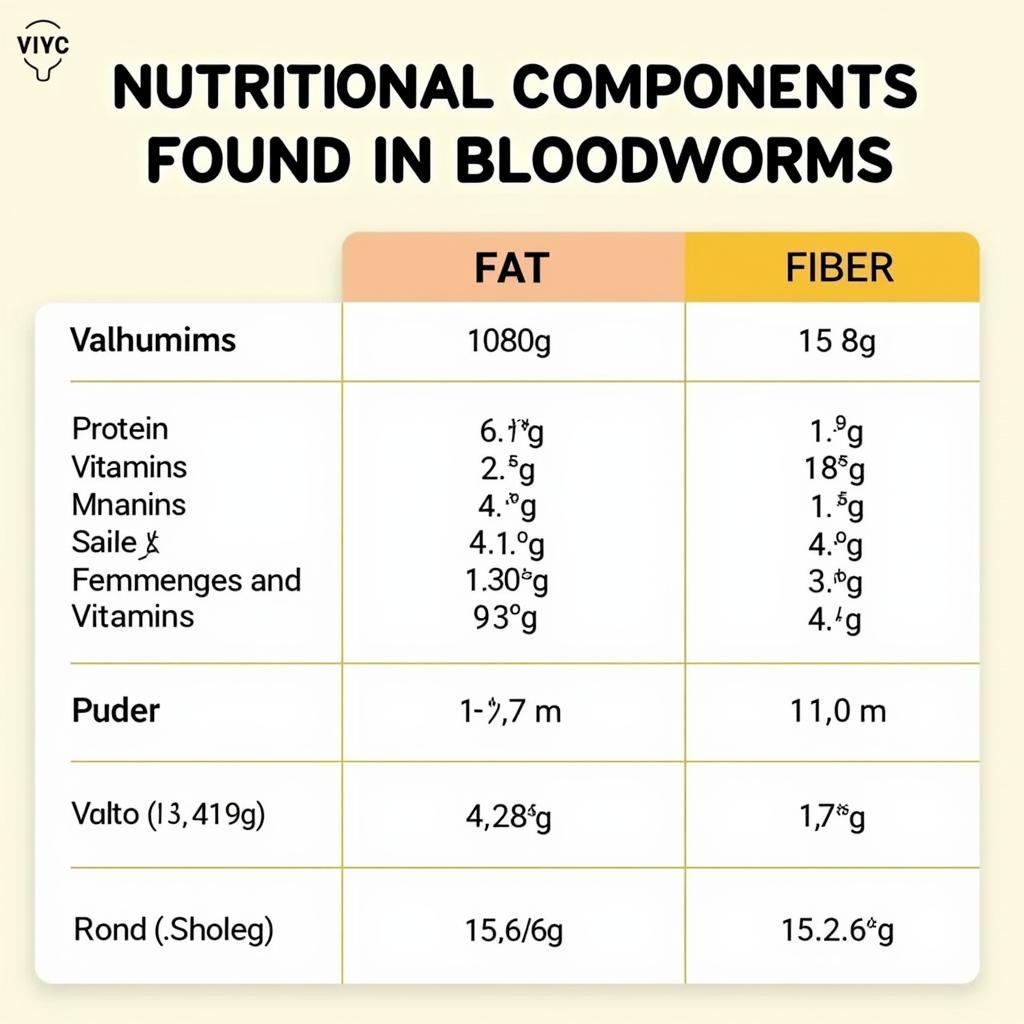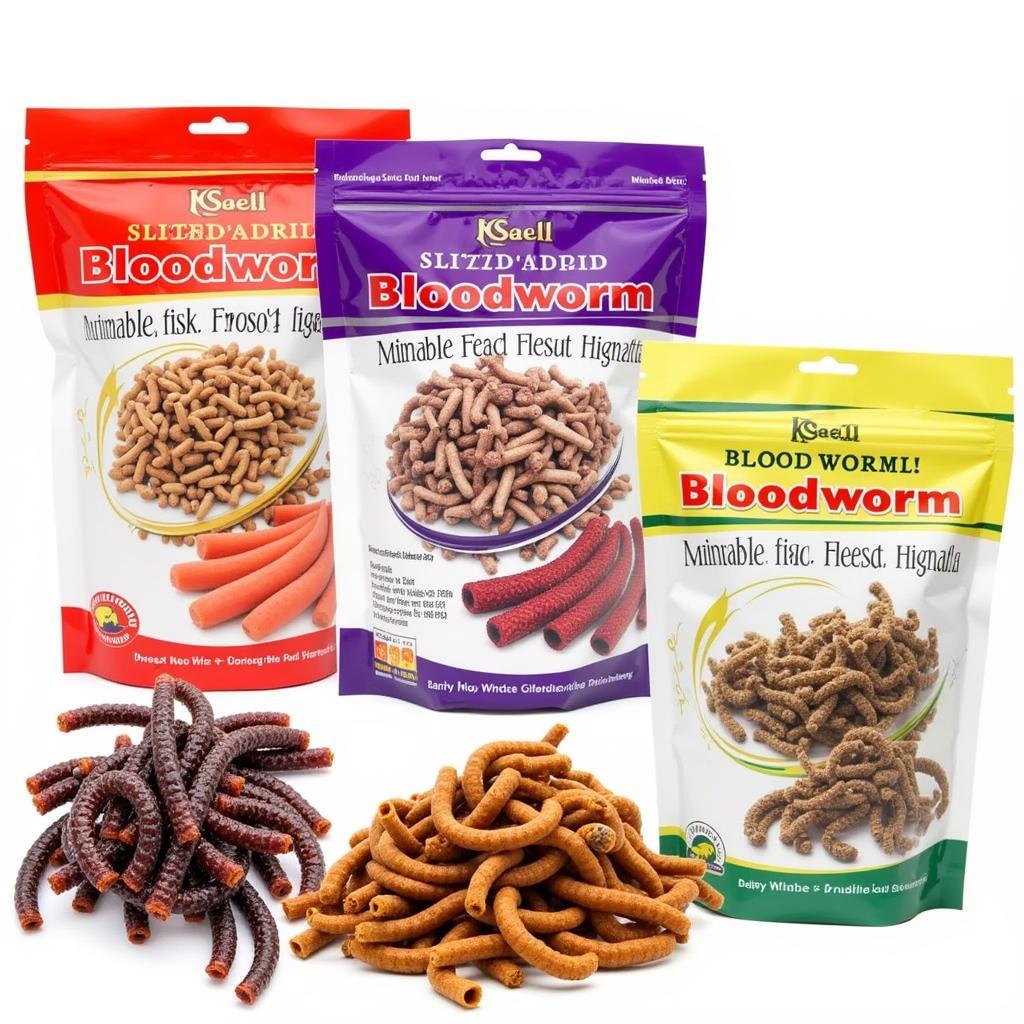Bloodworms are a popular and nutritious food source for many aquarium fish. These small, red larvae are packed with protein and other essential nutrients that can help your fish thrive. Whether you have bettas, goldfish, or tetras, understanding the benefits and proper use of Bloodworm Fish Food can enhance your aquarium and keep your finned friends happy and healthy.
Unveiling the Nutritional Powerhouse: What Makes Bloodworms So Beneficial?
 Bloodworms Nutritional Content Table
Bloodworms Nutritional Content Table
Bloodworms are a natural part of the aquatic food chain and are a rich source of protein, which is essential for fish growth, muscle development, and overall health. They are also a good source of fatty acids, which provide energy and support various bodily functions. Additionally, bloodworms contain vitamins and minerals like iron, which helps with oxygen transport in the blood.
Types of Bloodworm Fish Food Available: Finding the Right Fit for Your Aquarium
 Different Types of Bloodworm Fish Food
Different Types of Bloodworm Fish Food
Bloodworm fish food is available in different forms, each with its own pros and cons. Let’s explore the most common types:
-
Frozen Bloodworms: These are a popular choice among aquarists due to their convenience and nutritional value. Frozen bloodworms are readily available at most pet stores and can be stored in the freezer for several months.
-
Freeze-dried Bloodworms: This type of bloodworm fish food undergoes a process that removes moisture, resulting in a longer shelf life. While freeze-dried bloodworms retain some nutrients, they might be less appealing to picky eaters due to their texture.
-
Live Bloodworms: Offering the highest nutritional value, live bloodworms are the closest to what fish would consume in the wild. However, they require careful handling and storage to prevent spoilage and potential health risks to your fish.
Choosing the Best Bloodworm Fish Food: Factors to Consider
When selecting bloodworm fish food, consider the following factors:
-
Type of Fish: Different fish species have different dietary needs. Research the specific requirements of your fish to ensure you are choosing a suitable bloodworm product. For instance, some cichlids fish food includes bloodworms as a supplement.
-
Quality and Source: Opt for reputable brands that prioritize quality and source their bloodworms from clean and safe environments.
-
Additional Ingredients: Some bloodworm fish food products may contain additional ingredients like vitamins or minerals. Assess these additions to ensure they align with your fish’s dietary needs.
-
Form and Size: Consider the form and size of the bloodworms. Frozen and freeze-dried options offer convenience, while live bloodworms may be more enticing for some fish. Additionally, choose a size appropriate for your fish to consume easily.
Feeding Bloodworms to Your Fish: Tips for Responsible Aquarium Keeping
 Feeding Bloodworms to Fish
Feeding Bloodworms to Fish
While bloodworms can be a nutritious treat, it’s essential to feed them in moderation to avoid overfeeding and potential water quality issues. Here are some tips for responsible feeding:
-
Moderation is Key: Bloodworms should not constitute the entirety of your fish’s diet. Instead, offer them as a supplement to a balanced diet of flakes, pellets, or other appropriate foods.
-
Thawing and Rinsing (Frozen Bloodworms): Before feeding frozen bloodworms, thaw them completely and rinse them thoroughly under running water. This helps remove excess water and potential contaminants.
-
Portion Control: Feed only what your fish can consume within a few minutes to prevent uneaten food from decaying and polluting the water.
-
Monitoring Water Quality: Bloodworms, especially live ones, can impact water quality. Regularly monitor water parameters and perform partial water changes as needed to maintain a healthy environment.
Frequently Asked Questions About Bloodworm Fish Food
Q1: Can I feed bloodworms to all types of aquarium fish?
While many fish species enjoy bloodworms, it’s always best to research the specific dietary needs of your fish. Some fish may have sensitivities or specific nutritional requirements.
Q2: How often should I feed bloodworms to my fish?
Bloodworms are best offered as a treat or supplement a few times a week. Overfeeding can lead to health problems and water quality issues.
Q3: Can I culture live bloodworms at home?
Culturing live bloodworms at home can be challenging and requires specific equipment and knowledge. It’s generally recommended to purchase them from reputable suppliers.
Q4: Are there any risks associated with feeding live bloodworms?
Live bloodworms, if not sourced from a reputable supplier, can carry parasites or diseases that could potentially harm your fish. Always choose suppliers known for their quality and safety standards.
Q5: What should I do if my fish refuses to eat bloodworms?
Some fish may be picky eaters. If your fish doesn’t readily accept bloodworms, try a different form (frozen, freeze-dried) or offer them in small amounts alongside their regular food.
Need More Information?
Explore these related articles for further insights:
For personalized advice on choosing the best bloodworm fish food for your aquatic companions, don’t hesitate to contact us. Our team at Mina Cones Food is dedicated to helping you provide the best possible care for your finned friends. You can reach us at Phone Number: 02437655121, Email: minacones@gmail.com or visit our address at 3PGH+8R9, ĐT70A, thôn Trung, Bắc Từ Liêm, Hà Nội, Việt Nam. We have a dedicated customer support team available 24/7.